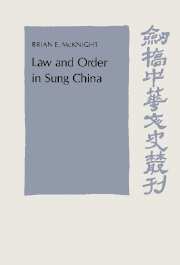Book contents
- Frontmatter
- Contents
- List of figures, maps, and tables
- Preface
- List of abbreviations
- 1 Introduction
- 2 The historical context
- 3 Crimes and criminals
- 4 Informal and semiformal agencies of law enforcement
- 5 Formal civil agencies of law enforcement
- 6 The role of the military in law enforcement
- 7 Supervision of law enforcement – the role of the intendants
- 8 Personnel selection
- 9 Urban crime and urban security
- 10 The Sung penal system
- 11 Jails and jailers in the Sung
- 12 Penal registration
- 13 The death penalty
- 14 Modifications of penalties
- 15 Conclusion
- Glossary
- Bibliography
- Index
13 - The death penalty
Published online by Cambridge University Press: 23 December 2009
- Frontmatter
- Contents
- List of figures, maps, and tables
- Preface
- List of abbreviations
- 1 Introduction
- 2 The historical context
- 3 Crimes and criminals
- 4 Informal and semiformal agencies of law enforcement
- 5 Formal civil agencies of law enforcement
- 6 The role of the military in law enforcement
- 7 Supervision of law enforcement – the role of the intendants
- 8 Personnel selection
- 9 Urban crime and urban security
- 10 The Sung penal system
- 11 Jails and jailers in the Sung
- 12 Penal registration
- 13 The death penalty
- 14 Modifications of penalties
- 15 Conclusion
- Glossary
- Bibliography
- Index
Summary
Introduction
The death penalty as it was generally practiced in traditional China was the ultimate demonstration of the ruler's power and the ultimate humiliation of the powerless victim. Like executions in early Europe, it was a profound and loud message to all concerned and therefore required a public ceremonial. The victim was executed in public, and sometimes his head would be publicly displayed. His personal suffering at the same time shamed his family and his ancestors. One early Chinese term for execution, still used in Sung texts, means, literally, “casting away in the marketplace” (ch'i-shih). The victim suffered the final ostracism, being cast out from this world. The ceremony reinforced the message about the relationship between criminal punishment and war and reiterated the role of the criminal as a foreign attacker of society, for the ax or the sword was in the hands of a soldier.
In antiquity, Chinese states used a wide variety of forms of execution, frequently brutal and sometimes public. Burning, cutting in two at the waist, dismembering, being torn apart by chariots, slicing, the list goes on and on. The sources, however, give the impression that the most gruesome penalties (with the notable exception of death by slicing) were far more common before the creation of the unified empire in the third century B.C. During the Ch'in and the Han there was a movement toward a more limited repertoire of forms of execution, strangulation and beheading being the most common. These two penalties continue to be the most typical forms of execution for the rest of traditional Chinese history.
- Type
- Chapter
- Information
- Law and Order in Sung China , pp. 446 - 471Publisher: Cambridge University PressPrint publication year: 1992



